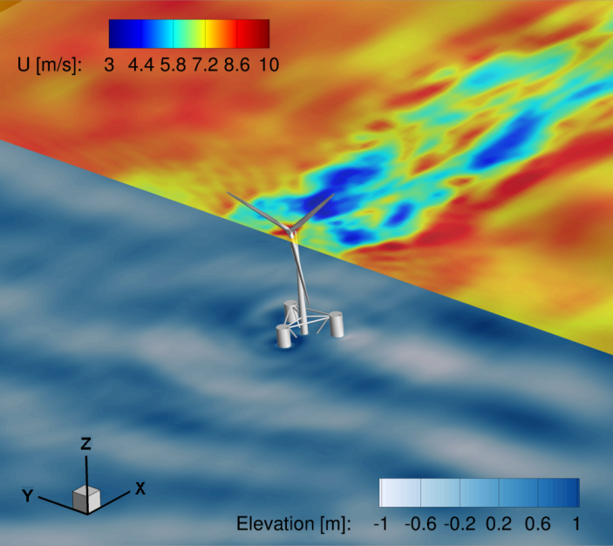VFS Geophysics: Solver Development, Debugging, Enhancement, and Validation
VFS-Geophysics: Open-Source CFD Solver Development and Enhancement

Background
- Project: Contributor to the open-source Virtual Flow Simulator (VFS-Geophysics) CFD solver
- VFS Wind has been extensively used for wind and environmental applications. The project has contributed to development, enhancement, and debugging this tool to build a comprehensive tool for marine and environmental simulation to contribute to Atlantic Marine Energy Center (AMEC) projects.
- VFS-Geophysics is a high-performance computational fluid dynamics solver specifically designed for geophysical flow applications including wind, tidal, environmental, and biological flow modeling.
- Key development areas: solver optimization, numerical methods enhancement, debugging complex flow physics, validation against experimental data, and performance benchmarking for AMEC research initiatives.
Development Challenges
- Extending VFS Wind capabilities from wind-focused applications to comprehensive marine energy simulations for AMEC projects.
- Implementation of advanced turbulence models and large-eddy simulation (LES) capabilities for geophysical flows.
- Optimization of parallel computing performance and scalability on high-performance computing systems.
- Development of robust numerical schemes for complex geometries using immersed boundary methods.
- Integration of multiple physics modules including sediment transport, fish-turbine interaction, and wave dynamics for marine applications.
- Ensuring code reliability and accuracy through comprehensive validation and verification studies for AMEC research requirements.
Contributions to VFS-Wind/VFS-Geophysics
- Enhancement and extension of VFS Wind solver capabilities for marine energy applications supporting AMEC research objectives.
- Wave and Current Modeling Capabilities: Implementation of advanced wave-current interaction models for realistic marine environment simulations.
- Control Co-design Algorithms: Development of collective pitch control and individual pitch control algorithms for optimized turbine performance.
- Blade Hydroelasticity Modeling: Implementation of blade structural dynamics and its coupling to flow solver, hydrodynamics solver, and control algorithms for comprehensive fluid-structure interaction analysis.
- Sediment Transport Simulation: Enhancement of sediment transport capabilities using Eulerian-Lagrangian coupling frameworks for environmental impact assessment.
- Lagrangian Particle Tracking: Development of advanced particle tracking algorithms for studying fish behavior, sediment dynamics, and pollutant dispersion.
- Synthetic Turbulence Generator Model: Implementation of synthetic turbulence generation capabilities to replicate realistic turbulence modeling for improved flow field initialization and boundary conditions.
- Data Analysis and Automated Workflows: Development of comprehensive modules for data analysis and pre/post processing automated workflows using Python and MATLAB for enhanced research productivity and reproducible results.
- Debugging and optimization of memory management and computational efficiency in parallel environments.
- Validation studies comparing solver predictions with experimental and field measurement data for AMEC projects.
- Documentation and testing framework development for improved code maintainability and community adoption.
Technical Environment
- Computing: High-performance computing clusters with MPI parallelization
- Programming: C/C++, MATLAB, Python, Bash scripting
- Version Control: Git, GitHub collaboration workflows
- Build Systems: CMake, Makefiles, module environments
- Libraries: PETSc, MPI, BLAS/LAPACK
- Visualization: ParaView, VisIt, Tecplot for result analysis
This work contributes to the advancement of open-source computational fluid dynamics tools for geophysical applications, enabling researchers worldwide to access high-performance CFD capabilities for environmental and renewable energy studies. The enhancement of VFS Wind into a comprehensive marine simulation tool directly supports Atlantic Marine Energy Center (AMEC) research initiatives and advances sustainable marine energy development.
